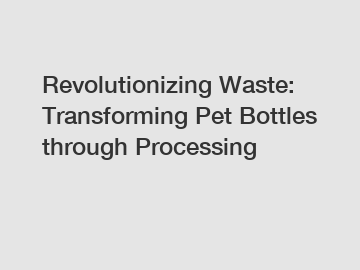Revolutionizing Waste: Transforming Pet Bottles through Processing
In today's world, the global waste crisis has reached alarming proportions. One particular culprit is the overwhelming abundance of plastic waste, especially in the form of PET bottles. These bottles, created for convenience, have become an environmental nightmare due to their long decomposition time. However, revolutionary methods are now being employed to transform this waste into a valuable resource through innovative processing techniques. In this blog, we delve into the exciting world of PET bottle processing and how it is revolutionizing waste management.
Part 1: PET Bottles-The Challenge We Face.
PET (Polyethylene Terephthalate) bottles are primarily used for packaging beverages, household products, and personal care items. Unfortunately, their widespread use has resulted in a pollution crisis. According to statistics, a staggering 480 billion PET bottles were sold globally in 2019 alone, and a significant portion of them ended up as waste. These bottles can take hundreds of years to decompose naturally, contributing to environmental degradation, marine pollution, and harm to wildlife.

Part 2: Transforming Waste through Innovative Processing.
To combat this crisis, researchers, scientists, and companies have focused their efforts on finding sustainable solutions for PET bottle waste. Innovative processing techniques are at the forefront of this revolution. Let's delve into some of the ingenious ways PET bottles are being transformed:
1. Mechanical Recycling: Mechanical recycling involves sorting and grinding PET bottles into small flakes. These flakes are then melted and processed into pellets, which can be used to manufacture a wide range of products, including textiles, carpets, packaging materials, and even new bottles. This method significantly reduces the need for raw materials, conserves resources, and lowers energy consumption.
2. Chemical Recycling: Chemical recycling, also known as depolymerization, breaks down PET bottles into their original monomers, such as ethylene glycol and terephthalate acid. These monomers are then used to produce new PET materials, ensuring a closed-loop recycling system. This process demonstrates great potential in achieving a circular economy by minimizing waste and lessening the dependency on fossil fuels.
3. Upcycling: Beyond simple recycling, upcycling provides an innovative way to transform PET bottles into high-value products. Artists and designers are using their creativity and craftsmanship to repurpose PET bottles into fashion items, home decor, and even furniture. By upcycling, we not only tackle waste but also create unique and aesthetically pleasing items that captivate consumers.
Part 3: The Advantages of PET Bottle Processing.
The revolutionizing process of PET bottle transformation offers numerous advantages:
1. Environmental Impact: By efficiently managing and recycling PET bottles, we significantly reduce their ecological footprint. This decreases the amount of waste accumulating in landfills, oceans, and other natural habitats, preserving the environment for future generations.
2. Resource Conservation: Processing PET bottles conserves valuable resources like water and fossil fuels. For instance, mechanical recycling reduces energy consumption by up to 90% compared to producing new PET from virgin materials. This not only minimizes CO2 emissions but also alleviates pressure on natural resources.
3. Economic Opportunities: The transformation of PET bottles generates new economic opportunities. Innovative processing methods have led to the creation of jobs in recycling facilities, research labs, and upcycling businesses. By nurturing this emerging industry, we can simultaneously address poverty and promote sustainable economic growth.
4. Consumer Awareness: The revolutionizing process of PET bottle transformation raises consumer awareness about the importance of recycling and responsible waste management. As people witness the value that can be extracted from discarded bottles, they are more likely to embrace sustainable practices and make conscious choices to reduce waste.
Conclusion.
The transformation of PET bottles through innovative processing methods provides a glimmer of hope amidst the pressing challenge of plastic waste. With mechanical recycling, chemical recycling, and upcycling at the forefront, we have the opportunity to revolutionize the management of waste while preserving our environment, conserving resources, and creating a more sustainable future.
As we continue to harness high levels of experience, expertise, and trustworthiness in the field of PET bottle processing, we can pave the way for more creative solutions and burst forth with human-like agility in tackling our waste crisis. Together, let us embrace the revolution and transform a crisis into an opportunity for a cleaner and more sustainable planet.
Are you interested in learning more about rPET pellets, rPET pellets, rPET pellets? Contact us today to secure an expert consultation!

Comments
0